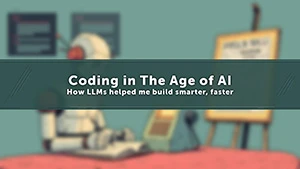
Image credit: Inspired by a master1305 image on Freepik
Originally appeared in LinkedIn Future Singularity
With the highs and lows of artificial intelligence (AI) capabilities that are happening daily, I'm fascinated by the potential AI holds. Not only within the bounds of what some view as stochastic parrots, but also with the potential to advance humankind. Massive volumes of data may be processed by AI systems to uncover insights that can be used to address global issues like hunger, sickness, education disparities, and climate change. Is it being used for all of that? Probably not, but it could be. AI might automate tedious jobs, freeing up people's time for relationships, learning, and creative endeavors. It offers unprecedented opportunities for innovation and efficiency, but it also presents significant challenges and risks, particularly when we begin to think about human rights and the impact that AI may have on them.
AI has enormous potential in a number of fields, including healthcare, education, economics, and entertainment. It is capable of reading millions of scientific publications, comprehending their conclusions, and hypothetically tying together seemingly disparate concepts to attempt to cure disease. As a matter of fact, you've probably previously heard about how AI algorithms can identify illnesses in their early stages, forecast patient outcomes, and suggest customized treatments. These applications demonstrate how AI may significantly improve patient outcomes and treatment approaches.
I actually touch on quite a bit of that in a previous post "AI Transforming Healthcare".
We are all aware that AI models are more than just chatbots and will eventually revolutionize healthcare as we know it. The advancements AI can bring about in terms of environmental sustainability have also been reported. Artificial intelligence (AI) is being utilized to better manage natural resources, forecast natural disasters, and improve energy use. AI-driven models can predict weather patterns remarkably accurately1, assisting communities in lessening the effects of extreme weather occurrences and preparing for them2. AI could model different climate policies and economic approaches to chart the best path towards sustainability. Meaning that the potential to use AI as a tool to help the human species thrive, is massive.
Human Rights
Even with its many benefits, improper management of AI can seriously jeopardize human rights. As AI capabilities grow more powerful the main areas of concern include privacy, security, discrimination, and accountability. These problems are real and are already showing up all across the world in different forms. To guarantee that AI development stays human-centric and upholds fundamental democratic ideals, society as a whole must engage in in-depth discussions and establish strong frameworks of checks and balances to govern its use.
Security & Privacy
Security and privacy breaches due to things like excess in monitoring are among the primary concerns regarding AI and human rights. Outside the U.S., AI-driven facial recognition and data monitoring technologies have already begun to be deployed in the crackdown on "dissidents" and ethnic minorities. Within the U.S., we must exercise caution to ensure that law enforcement AI technologies do not infringe upon constitutional rights in the name of public safety, even though this may already be a major worry in other nations. There must be strict guidelines governing what information can be gathered, how it is used, and how due process can be followed.
Additionally, there is a chance that AI-generated text, audio, or video forgeries, or "deepfakes," will be used as a weapon to disseminate false information. You can read more on my opinions on the topic in my post "Deep Fakes and the Shifting Landscape of Trust".
Amplifying Human Bias & Manipulation
In the context of artificial intelligence, bias, transparency, and manipulation are further human rights concerns. Prejudices based on race, gender, age, and other factors may be ingrained in the datasets used to train machine learning models, and these biases can then be reinforced at scale. Since all models are created by people and trained on potentially faulty data, they all exhibit biases. The biases of organizational teams, their designers, data scientists putting the models into practice, and data engineers collecting the data can all be reflected in machine learning models. They, of course, then also mirror the bias present in the data.
Machine learning inevitably has some bias because of the datasets and human teams who use them, but it doesn't imply we should put up with biased or unreliable AI systems. AI development must become an interdisciplinary endeavor in which politicians, ethicists, and affected populations are equal participants from the outset. If AI systems provide unfair or biased outcomes that go against fairness standards, then proactive auditing for bias and accountability mechanisms are required. You can read a deeper view in my post "Understanding AI Bias".
Philosophical Concerns
Then there are the difficult philosophical issues surrounding AI's inherent rights as these technologies develop and grow more self-aware. When does an artificial intelligence system become something that is worthy of rights and protections3, either as a living thing or as intellect? How might the legalization of AI personhood affect society and the economy?
Although some people write these off as problems for the far future (and I lean this way from time to time), given the speed at which AI is developing, we must begin examining these challenges now and from the perspective of human rights. We require multidisciplinary panels comprising philosophers, scientists, ethicists, policy specialists, and members of marginalized populations to assist in directing this discussion.
In order to guarantee that the advantages of transformational AI systems are shared fairly, we need also advocate for common democratic governance over them. We cannot permit a small, unelected group to act unilaterally in creating artificial general intelligence, which could then be used to reshape societies in accordance with their own prejudices and objectives.
Equalizer & Democratizer
We must not lose sight of AI's potential to greatly democratize and equalize access to information, economic opportunity, and human wellbeing despite all the hazards to human rights. Anyone in the world might receive a top-notch education from AI instructors. By managing back-office duties, AI may contribute to the democratization of wealth generation and entrepreneurship. Underserved communities could benefit from high-quality health advice and care provided by medical AI systems.
By using data analysis to more accurately identify inequity and exploitation, AI may potentially strengthen human rights. Based on procurement data, an AI currently exists to determine the dangers associated with forced labor for businesses4,5. Another AI keeps an eye out for signs of human trafficking in press articles and social media. AI has the potential to be a potent weapon in the fight against breaches of human rights as these capabilities advance6.
Conclusion
The consequences of AI for human rights ultimately depend on how we use and develop this potent technology. Will we allow dehumanization, bigotry, and oppression to be automated by AI? Or is it possible to use AI to increase human potential, promote freedom, and develop a more equitable society?
We still have time to steer AI research in a way that prioritizes morality, common sense, and human rights. However, we have to take the initiative. Strong governance mechanisms are necessary to guarantee that AI stays focused on people and that its advantages are distributed fairly. AI ethics boards should be implemented in businesses, and best practices for security, anti-bias, and transparency should be adhered to. Human rights should come first when deciding which AI applications to support as individuals based on our spending and usage patterns.
If we manage the evolution of AI appropriately, it has the transformational power to drastically improve human experience. It represents one of the great human rights challenges and opportunities of the 21st century. Let's address it with frank but civil dialogue aimed at enlarging the domain of human freedom and well-being. If we proceed with caution, we will remember this pivotal period as the moment we democratized abundance for everyone and upheld human rights.
References
- How can artificial intelligence help tackle climate change? https://greenly.earth/en-us/blog/ecology-news/how-can-artificial-intelligence-help-tackle-climate-change
- AI algorithms could be used to better forecast natural disasters, GAO report says https://fedscoop.com/machine-learning-forecast-natural-disasters-gao/
- Do AI Systems Deserve Rights? https://time.com/6958856/does-ai-deserve-rights-essay/
- Can Artificial Intelligence Fix Slavery in Supply Chains? https://www.frdm.co/blogs/can-artificial-intelligence-fix-slavery-in-supply-chains
- Forced labor in the clothing industry is rampant and hidden. This AI-powered search platform can expose it. https://news.northeastern.edu/2024/03/21/magazine/fashion-supply-chain-forced-labor/
- Combating Human Trafficking: How AI Revolutionizes the Fight https://www.veritone.com/blog/ai-public-safety-human-trafficking/


